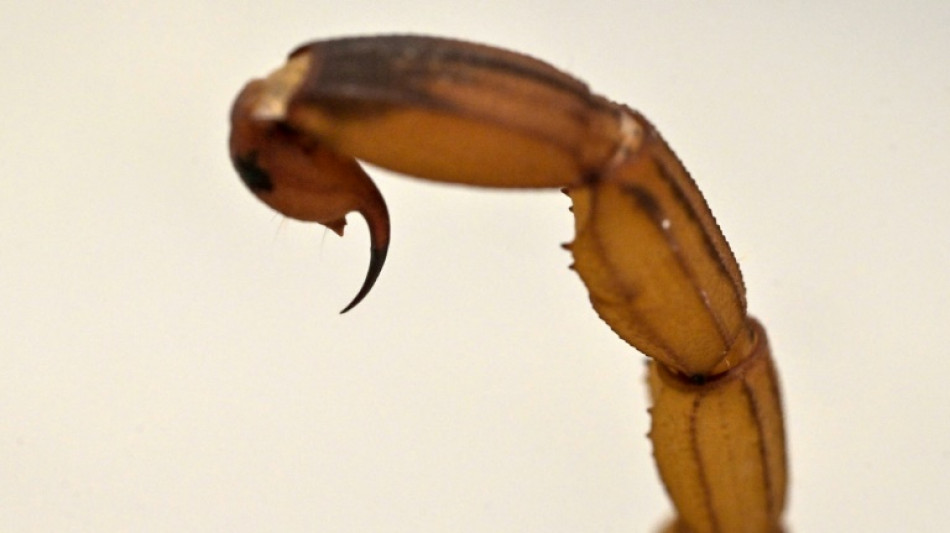
-
 Gunman held after failed attack on Sikh leader in India
Gunman held after failed attack on Sikh leader in India
-
Pakistan recall Babar Azam for South Africa tour, Sajid Khan out

-
 Seoul stocks sink amid S. Korea drama as Asian markets mixed
Seoul stocks sink amid S. Korea drama as Asian markets mixed
-
French appeals court to rule in Polanski defamation case

-
 Death toll rises to 29 in southern Thailand floods
Death toll rises to 29 in southern Thailand floods
-
South Korean opposition move to impeach president after martial law bid

-
 Trump's vows of quick peace fall flat on Ukraine frontlines
Trump's vows of quick peace fall flat on Ukraine frontlines
-
Soldiers vs office chairs: South Korea's martial law standoff

-
 Japan's Premier League pioneer Inamoto retires aged 45
Japan's Premier League pioneer Inamoto retires aged 45
-
Second major Myanmar rebel group calls for talks with junta

-
 FIFA to reveal Club World Cup draw amid apathy, legal threats
FIFA to reveal Club World Cup draw amid apathy, legal threats
-
Taiwan's Lai arrives in Tuvalu to shore up Pacific allies

-
 South Korean president pressed to step down over martial law bid
South Korean president pressed to step down over martial law bid
-
Huge Vietnam fraud case raises questions over banking system

-
 Ghana thrusts economy into limelight in tight race for president
Ghana thrusts economy into limelight in tight race for president
-
Philippines says China Coast Guard fired water cannon, 'sideswiped' govt vessel

-
 Vietnam pushes electric motorbikes as pollution becomes 'unbearable'
Vietnam pushes electric motorbikes as pollution becomes 'unbearable'
-
Seoul stocks sink amid S. Korea drama as Asian markets struggle

-
 Hong Kong mega development plan to devour villages, wetlands
Hong Kong mega development plan to devour villages, wetlands
-
French government risks falling in no-confidence vote

-
 Stokes fit as England name unchanged team for 2nd New Zealand Test
Stokes fit as England name unchanged team for 2nd New Zealand Test
-
Djokovic to begin bid for 25th Grand Slam crown in Brisbane

-
 Life has 'disappeared': Mexican city reeling from cartel infighting
Life has 'disappeared': Mexican city reeling from cartel infighting
-
IXOPAY and Aperia Compliance Merge to Extend Advanced Payment Data Security to Merchant Acquirers and Merchants of All Sizes, Worldwide

-
 S.Korea political upheaval shows global democracy's fragility - and resilience
S.Korea political upheaval shows global democracy's fragility - and resilience
-
Van Nistelrooy off to winning start at Leicester, Palace beat Ipswich

-
 Global stocks end mostly up with DAX crossing 20,000 for 1st time
Global stocks end mostly up with DAX crossing 20,000 for 1st time
-
Georgia's ombudsman accuses police of torturing pro-EU protesters

-
 Norway, Sweden win big to reach Women's Euro 2025
Norway, Sweden win big to reach Women's Euro 2025
-
Partner of ex-Abercrombie & Fitch CEO pleads not guilty to sex trafficking

-
 Leverkusen eliminate Bayern from German Cup after Neuer sees first red
Leverkusen eliminate Bayern from German Cup after Neuer sees first red
-
Syria rebels 'at gates' of central city Hama

-
 Amazon launches AI models to challenge rivals
Amazon launches AI models to challenge rivals
-
Bolivian ex-president, who fled to US, sentenced to six years prison

-
 Bayern's Neuer sent off for first time in 866-game career
Bayern's Neuer sent off for first time in 866-game career
-
Namibia elects its first woman president

-
 Scottish artist Jasleen Kaur wins 2024 Turner Prize
Scottish artist Jasleen Kaur wins 2024 Turner Prize
-
Barca hit five as they return to winning ways at Mallorca

-
 S. Korea president says will lift martial law
S. Korea president says will lift martial law
-
Olympic champion Evenepoel breaks hand, shoulder in postal van collision

-
 Syria rebels advance on central city
Syria rebels advance on central city
-
S. Korea's President Yoon, embattled conservative

-
 UK museum in talks with Greece over 'long-term' deal for Parthenon Marbles
UK museum in talks with Greece over 'long-term' deal for Parthenon Marbles
-
What we know about South Korea's martial law

-
 Biden announces $1 bn for Africa during maiden trip
Biden announces $1 bn for Africa during maiden trip
-
Retailers point to solid US sales over holiday weekend

-
 Europe-loving Blinken on last trip to NATO before Trump handover
Europe-loving Blinken on last trip to NATO before Trump handover
-
Seeking a new way of life under the sea - and a world record

-
 Defying headwinds, German stocks hit milestone
Defying headwinds, German stocks hit milestone
-
PGA Tour-LIV talks 'definitely moving' - Woods


Thriving scorpion population is stinging problem for Brazil
Forget snakes, it's scorpions Brazilians most need to worry about.
The arachnids -- feared for the toxic stinger poised atop their tails -- are proliferating thanks to urbanization and warming temperatures.
The result is that scorpions have become the most lethal poisonous animal in Brazil, posing a growing danger for people across the whole country -- and spurring demand for antivenom.
The most widely found species in the country, the Brazilian yellow scorpion, is the most dangerous scorpion in South America.
Unusually for scorpions, this all-female species also reproduces asexually, reducing population-control options.
"With a warming habitat, these animals' metabolisms are also warming, so they are more active, eating more and reproducing more," explained Thiago Chiariello, production coordinator of the scorpion antivenom lab at Brazil's Instituto Butantan in Sao Paulo.
Add to that rampant urbanization which both scares away scorpions' natural predators such as lizards and birds while boosting the number of available cockroaches -- tasty meals for the arachnids -- and the problem is evident.
"Cities are growing unchecked" and the spread of trash they bring means more food supply for scorpions, Chiariello said.
"This is leading to more contact with people, which means more accidents."
- Soaring sting numbers -
Last year -- the latest dataset available -- there were 152 deaths from scorpion stings in Brazil, compared with 140 from snakebites. That was an increase from 2019, when 95 deaths by scorpion sting were recorded.
According to Brazil's health ministry, there were more than 200,000 scorpion sting incidents registered last year -- 250 percent more than a decade earlier, and an average of nearly 550 stings per day.
Healthy adults might get mild to moderate symptoms from a Brazilian yellow scorpion sting, including pain, vomiting, profuse sweating and tremors.
But there are more severe symptoms -- including shock, fluid build-up in the lungs, cardiovascular collapse and heart failure -- that can prove deadly, especially for children and the elderly.
- Life-saving antivenom -
That makes the Butantan institute's antivenom very important.
Chiariello's team carry out their serum-making task in making that serum with extreme precision.
They first use tweezers to guide a live scorpion's stinger into a container.
The poison is then injected into horses, which are less vulnerable to the toxin's effects than humans, and which produce more antibodies.
"There is a whole purification process in the horses' blood," explained Paulo Goldoni, a biologist at the institute.
"The serum is the only way to save lives," he said.
Last year saw more than 11,000 people in Brazil receive scorpion antivenom, mostly in the country's heavily populated southeast, according to authorities.
With serum demand growing, but also the number of available scorpions, the Instituto Butantan has a steady supply of venom donors.
"If ever there was a lack of serum, we would certainly see a serious increase in the number of deaths," the biologist said.
K.Brown--BTB


